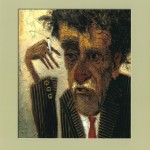Every Monday in Books Besides the Bible, Ethan Bartlett considers the value and pleasure of reading for Christians.
A couple weeks ago the New York Times Book Review published an essay by Roger Rosenblatt entitled “The Writer in the Family.” I loved it, in all its self-effacing candor. Rosenblatt begins:
So there I stood at the front of my granddaughter Jessica’s fourth-grade classroom, still as a glazed dog, while Jessie introduced me to her classmates, to whom I was about to speak. “This is my grandfather, Boppo,” she said, invoking my grandpaternal nickname. “He lives in the basement and does nothing.”
Her description, if terse, was not inaccurate. My wife and I do live on the lower level of our son-in-law’s house with him and our three grandchildren. And, as far as anyone in the family can see, I do nothing, or next to it. This is the lot of the writer.
This made me pause to think about writers in the church. Later in his essay, Rosenblatt mentions the old platitude “it takes all kinds,” something that Saint Paul says in much greater spiritual depth in 1 Corinthians 12, when he compares the church as the body of Christ to a literal body–making the point that just as a body needs hands and feet and eyes and many various parts, so the body of Christ “takes all kinds,” so that “there are many parts, but one body.”
I suspect that it is partly because of this idea that writers in the church have always been respected, even honored. It also has to do with the fact that the basis of the Christian religion is largely or entirely based (depending on who one asks) on the written word, so that those members of the Christian family who might seem to “sit in the basement and do nothing” are highly valued, in that their vocation is to preserve and endeavor to elucidate the very lifeblood of the church.
Late in his essay, Rosenblatt says, “We writers may be unfit for human consumption, but something about the malleable, permeable family structure says to us, That’s O.K. Of course, to further indicate how unfit we can be, we are perfectly capable of abusing that tolerance and calling it boring.” Is this true of Christian writers? Do we abuse the very family that takes us in?
These rhetorical questions could lead to a long and sticky discussion about the place of criticism in the church. Writers have traditionally been best-placed to conduct criticism, a fact which has been both beneficial and harmful. But in looking only at, say, novelists, there might seem to be some justice in Rosenblatt’s accusation as applied to Christian writers.
Flannery O’Connor, for example, probably has more Christians in her stories who are hypocrites (or worse) than who are anything like heroic; John Updike’s characters certainly detail their share of Christian hypocrisy. Garrison Keillor, who is quietly but unabashedly a Christian, portrays Christians as being just as dissatisfied, hypocritical and sinful as anybody else. In C.S. Lewis’s stories, the characters are usually more starkly drawn in terms of saints and sinners, but all of his more saintly characters have their flaws, and Lewis seems to take the greatest interest in redeeming sinners and hypocrites–cf. Edmund and Eustace in various Narnia books, and Ransom in the Space Trilogy.
So do Christian writers bite the hand that feeds (or at least nurtures) us? Certainly that danger exists; but writers in the church are also uniquely placed to portray the church in a realistic way. In a fallen world, the church will have its share of hypocrites, messes, and reprobates; writers portraying real people such as these are uniquely placed to help readers face the problem, and to help readers gain perspective on possible solutions.











